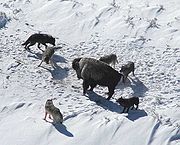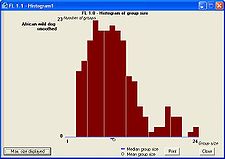.gif)
Pack (canine)
Encyclopedia



Canidae
Canidae is the biological family of carnivorous and omnivorous mammals that includes wolves, foxes, jackals, coyotes, and domestic dogs. A member of this family is called a canid . The Canidae family is divided into two tribes: Canini and Vulpini...
. Not all species of canids - notably the red fox
Red Fox
The red fox is the largest of the true foxes, as well as being the most geographically spread member of the Carnivora, being distributed across the entire northern hemisphere from the Arctic Circle to North Africa, Central America, and the steppes of Asia...
- form packs. Pack size
Group size measures
Many animals, including humans, tend to live in groups, herds, flocks, bands, packs, shoals, or colonies of conspecific individuals. The size of these groups, as expressed by the number of participant individuals, is an important aspect of their social environment...
and social behaviour within packs varies across species.
Species which exhibit pack behavior
African wild dogsAfrican Wild Dog
Lycaon pictus is a large canid found only in Africa, especially in savannas and lightly wooded areas. It is variously called the African wild dog, African hunting dog, Cape hunting dog, painted dog, painted wolf, painted hunting dog, spotted dog, or ornate wolf...
(Lycaon pictus) live and hunt in packs. Males assist in raising the pups, and remain with their pack for life, while the females leave their birth pack at about age two and a half years old to join a pack with no females. Males outnumber the females in a pack, and usually only one female breeds, with all of the males. African wild dogs are not territorial, and they hunt cooperatively in their packs, running down large game and tearing it apart. They cooperate in caring for wounded and sick pack members as well as the young.
Gray wolves
Gray Wolf
The gray wolf , also known as the wolf, is the largest extant wild member of the Canidae family...
(Canis lupus) usually live in packs which consist of the adult parents and their offspring of perhaps the last 2 or 3 years. The adult parents are usually unrelated and other unrelated wolves may sometimes join the pack.
Black-backed jackals
Black-backed Jackal
The black-backed jackal , also known as the silver-backed or red jackal, is a species of jackal which inhabits two areas of the African continent separated by roughly 900 km. One region includes the southern-most tip of the continent, including South Africa, Namibia, Botswana, and Zimbabwe...
(Canis mesomelas) have a single long term mate, and usually hunt singly or in pairs. Both parents care for the young, and the parents and their current offspring are the pack. They will cooperate in larger packs to hunt large game.
The Ethiopian wolf
Ethiopian Wolf
The Ethiopian wolf , also known as the Abyssinian wolf, Abyssinian fox, red jackal, Simien fox, or Simien jackal is a canid native to Africa...
(Canis simensis) has different social behavior from the gray wolf: pack members hunt alone for rodents, and come together mainly to defend their territory from other packs.
Domestic dogs
Dog behavior
Dog behavior refers to the collection of behaviors by the domestic dog, Canis lupus familiaris, and is believed to be influenced by genetic, social, situational and environmental causes. The domestic dog is a subspecies of the grey wolf, and shares many of its behavioral characteristics...
(Canis lupus): Despite being genetically the same species as the grey wolf, it is unclear what the similarities are between the pack behaviour of the dog and the gray wolf. Domesticated dogs have had humans as part of dog social structure for at least 12,000 years, and human behaviour is not the same as wolf behaviour. Studies of dog behaviour include studies of dogs and their interactions with humans, and "dumped" or "road" dogs that were raised by humans and then left to fend for themselves (e.g. The Tuscany Dog Project).
Dominance and the "alpha wolf"
Gray wolves (Canis lupus) have been shown through genetic analysis to be of the same species as the domestic dog. Although 12,000 (or more) years of domestication have altered the dog physically and socially, dog trainers have attempted to use the close genetic relationship between the dog and the gray wolf to develop techniques for modifying domestic dog behaviour (based on research on gray wolves in the wild.)One of the most persistent theories in dog training literature is the idea of the "alpha wolf," an individual gray wolf who uses physical force to enforce dominance hierarchy within the wolf pack. The idea was first found in early wolf research, and later adopted by dog trainers. The term "alpha" was popularized in 1976 in the dog training book "How To Be Your Dog's Best Friend" (Monks of New Skete
New Skete
New Skete is the collective term for three Orthodox Christian monastic communities in Cambridge, New York :...
), which introduced the idea of the "alpha roll
Alpha roll
An alpha roll is a technique used in dog training to discipline a misbehaving dog. It consists of flipping the dog onto its back and holding it in that position, sometimes by the throat...
", a technique for punishing unwanted dog behaviours. Human psychologist and dog trainer Stanley Coren
Stanley Coren
Stanley Coren is a psychology professor and neuropsychological researcher who has become best known to the general public for a series of books regarding the intelligence, mental abilities and history of dogs...
in the 2001 book "How to Speak Dog" says "you are the Alpha dog...You must communicate that you are the pack leader and dominant".
The idea of an aggressively dominant "alpha wolf" in gray wolf packs has been discredited by wolf biologists and researchers, and so-called "alphas" in packs are merely the breeding animals. According to wolf biologist L. David Mech
L. David Mech
Lucyan David "Dave" Mech is an internationally recognized wolf expert, a senior research scientist for the U.S. Department of the Interior's U.S. Geological Survey , and an adjunct professor at the University of Minnesota in St. Paul...
,
"Calling a wolf an alpha is usually no more appropriate than referring to a human parent or a doe deer as an alpha. Any parent is dominant to its young offspring, so "alpha" adds no information. Why not refer to an alpha female as the female parent, the breeding female, the matriarch, or simply the mother? Such a designation emphasizes not the animal's dominant status, which is trivial information, but its role as pack progenitor, which is critical information. The one use we may still want to reserve for "alpha" is in the relatively few large wolf packs comprised of multiple litters. ... In such cases the older breeders are probably dominant to the younger breeders and perhaps can more appropriately be called the alphas. ... The point here is not so much the terminology but what the terminology falsely implies: a rigid, force-based dominance hierarchy."
Training techniques assumed to be wolf pack related such as scruff shaking, the "alpha roll" and recommendations to be "alpha" to your dog continue to be used and recommended in dog training. In addition, the use of such techniques may have more to do with human psychology than with dog behaviour; "Dominance hierarchies and dominance disputes and testing are a fundamental characteristic of all social groups... But perhaps only we humans learn to use punishment primarily to gain for ourselves the reward of being dominant.

